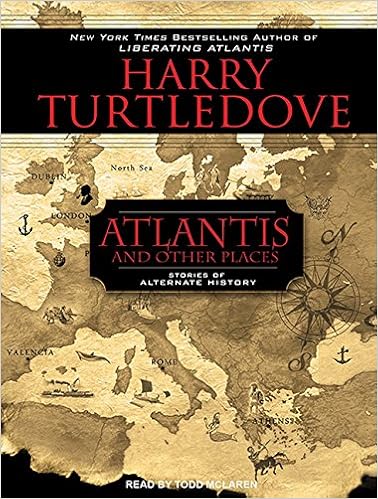
If you are into alternative history but have not previously read the twelve short stories and novellas in this collection you will probably really enjoy at least some of them. However, you may find it wise to check before buying which of them you have already seen.
The stories in this anthology and where they previously appeared are
1) Aubudon in Atlantis, first published in Analog, Dec 2005
2) Bedfellows, first pub. Magazine of Fantasry & SF, June 2005
3) News from the Front, first pub. Asimov's SF magazine June 2007
4) The Catcher in the Rhine, first pub. "The Chick is in the Mail" ed. Esther Friesner
5) The Daimon, first published in Turtledove's previous anthology, "Worlds That Weren't"
6) Farmer's Law, first pub. "Crime Through Time: III" ed. Sharon Newman
7) Occupation Duty, first pub. "Time Twisters" ed Jean Rabe and Martin Greenberg
8) The Horse of Bronze, first pub. The First Heroes: New Tales of the Bronze Age Ed. Turtledove and Noreen Doyle
9) The Genetics Lecture, first pub. Analog, Oct 2005
10) Someone is stealing the great throne rooms of the Galaxy, first pub. "Space Cadets" ed. Mike Resnick
11) Uncle Alf, first pub "Alternate Generals II" ed. Turtledove, Roland Green and Martin Greenberg
12) The Scarlet Band, first pub. Analog, May 2006.
The stories in this collection range from the very short ("The Genetics Lecture" is a three page, one joke story) to novellas (the stories set in Turtledove's "Atlantis" alternative universe which bookend this collection are both about 70 pages.) They vary considerably in style and tone, from humorous pastiche to deadly serious, from the Bronze age to the far future, from things which could easily have happened to whimsical fantasies, one of which was classed as a "Probability zero" feature when it first appeared in Analog. A significant proportion of the stories in the book are detective stories of one kind or another, others are tales of war, exploration, or scientific discovery.
I'm not going to attempt to describe the subjects covered by all these stories in detail as that might easily give rise to spoilers, but these also vary greatly. One has a ship crewed by centaurs visiting Britain in the Bronze age, when the British isles were known as the Tin Islands and were so remote as to be seen as the stuff of legends in the then civilised world. In fact, I found this story piquant because in the Bronze age "the Tin Islands" were so little known that Herodotus in his The Histories (Oxford World's Classics)", actually queried the existence of the British Isles on the grounds that he had been unable to find an eye witness who could give a first hand account of them, on a page adjacent to a preposterous account of dangerous gold-digging giant ants, which he swallowed whole because he found several alleged eye-witnesses who claimed to have seen them!
Another story has sergeant Hitler searching for communist spies and French rebels while posted to German-occupied France in a world in which the Central Powers won the First World War. A story told mainly from the viewpoint of Socrates suggests how a different response by Alcibiades to the charges brought against him at the time of the Athenian expedition to Sicily could have changed the course of the Peleponessian war with increasingly dramatic results.
If Goliath of Gath, the philistine warrior, had won his single combat, which in our world was won by his opponent David, there would presumably be no Judaism, no Christianity, and no Islam. Do you think that would mean no wars in the middle east? Turtledove invites you to think again.
Perhaps the most thought-provoking story in the book illustrates the potentially disastrous consequences had the American media reported the Second World War in the way that certain media outlets operate now.
Overall this is a very good, wide-ranging of Harry Turtledove's alternative history works which will appeal to most fans of his work in this genre provided they have not already read too many of the stories included.
No comments:
Post a Comment